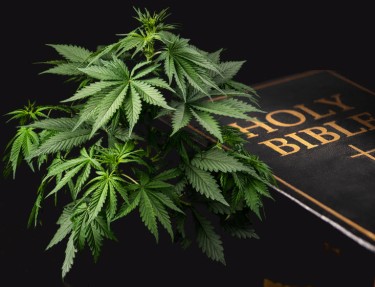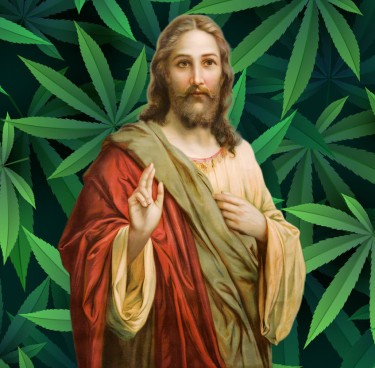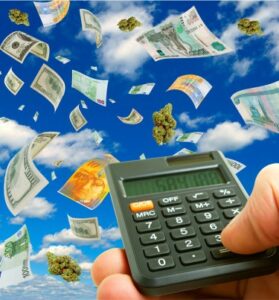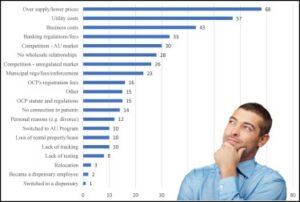
Navigating the complex interplay of dogma, morality, and societal evolution is no small feat, especially when confronting the deeply entrenched beliefs of institutions like the Church. The recent moralistic opposition to cannabis legalization by Archbishop Aquila is a testament to the persistent challenge of dispelling dogmas that have long outlived their relevance. Dogma, by its very nature, discourages questioning and promotes a static view of morality, often running counter to the dynamic nature of human societies and cultures.
The Church, historically, has not just been a religious institution but also a cultural and moral compass, deeply intertwined with the state's governance despite the ostensible separation of church and state. This role has often seen the Church act as a spiritual enforcer of societal norms, aligning closely with government policies. The issue at hand, however, is not just about the alignment of the Church with governmental policies, but the rigidity with which it clings to outdated ideas in the face of an evolving society.
We are witnessing a significant shift in cultural and societal norms, a transition from the age-old Piscean values to an era where individual empowerment and enlightenment take precedence — an age where 'Man becomes God.' This paradigm shift challenges the traditional authority of institutions like the Church, forcing them to confront and adapt to new societal realities or risk becoming obsolete.
Archbishop Aquila's arguments against cannabis legalization are a clear example of the struggle faced by religious institutions in this new era. The archbishop’s views reflect a refusal to acknowledge the changing perceptions and understanding of cannabis, both medically and recreationally. It is this reluctance to evolve and reconsider long-held beliefs in light of new evidence and societal changes that Reginald seeks to challenge.
In this article, we will scrutinize Archbishop Aquila's claims, breaking down each argument with a blend of factual information, contemporary societal understanding, and a touch of irreverent humor. The goal is not merely to counter the archbishop's viewpoints but to highlight the broader issue of how dogmatic beliefs can hinder societal progress and the acceptance of new ideas.
As we embark on this analytical journey, it’s essential to remember that questioning and challenging dogma is not just about winning an argument. It’s about fostering a society that values critical thinking, embraces change, and respects individual choice. It’s about creating a world where dogma does not stifle innovation and progress but coexists with an ever-evolving understanding of what it means to be human.
The claim made by Archbishop Aquila, suggesting that the "typical marijuana user consumes 40 mg of THC at a time," not only lacks empirical evidence but also illustrates a fundamental misunderstanding of cannabis consumption habits and its effects. This assertion, likening a cannabis session to consuming "8 to 16 drinks in one sitting," is not just exaggerated but misleadingly compares the effects of cannabis to that of alcohol, a substance with entirely different pharmacodynamics and societal impacts.
To contextualize the archbishop's claim, it’s crucial to understand the typical THC content in cannabis products. The average cannabis flower contains about 10-15% THC. Even in the case of concentrates, which have a higher THC percentage, the actual amount of THC consumed per session doesn't come close to 40 mg. Most consumers, based on usage patterns and product availability, consume between 7-14 grams of cannabis per week. This consumption level is far more akin to enjoying 1-2 beers than the exaggerated equivalence of 8-16 alcoholic drinks.
Moreover, Archbishop Aquila's comparison neglects the differences in the half-life and impact on motor skills between cannabis and alcohol. While alcohol is known for its significant impairment of motor skills and judgment, leading to potentially dangerous situations, cannabis does not produce such extreme effects. The comparison, therefore, is not only inaccurate but irresponsibly conflates two vastly different substances.
This misunderstanding or misrepresentation by Archbishop Aquila is emblematic of a broader issue: the perpetuation of mistruths and stigma surrounding cannabis. Such claims, especially when coming from influential figures, contribute to the ongoing misinformation and prejudice against cannabis users. It is essential for public discourse to be grounded in facts and empirical data, rather than perpetuating outdated and disproven stereotypes.
For a religious leader like Archbishop Aquila, who holds a position of trust and influence, it is disappointing to see such a lack of insight and accuracy in discussing cannabis use. It is reminiscent of another biblical figure known for spreading falsehoods.
The sweeping claim by Archbishop Aquila that "Marijuana is shown to do great harm to users" is another example of a broad generalization that fails to recognize the complexity and nuances of cannabis use. It is a reductionist approach that unjustly demonizes cannabis by ignoring the diversity of user experiences and the multitude of factors that contribute to substance-related harm.
Empirical evidence suggests that while excess consumption of anything, including cannabis, can have detrimental effects, the assertion that all users are uniformly affected is inaccurate. In reality, the majority of cannabis users – approximately 9 out of 10 – can maintain a healthy relationship with the substance. For many, cannabis serves not as a harmful vice but as a source of relief and comfort, especially for medical purposes. These users navigate their cannabis use responsibly, without it leading to significant adverse effects in their lives.
It is also crucial to acknowledge that there is a subset of individuals in every demographic who may be more susceptible to addiction and substance misuse. This susceptibility, however, is not unique to cannabis and is a complex interplay of genetic, environmental, and psychological factors. Blaming cannabis exclusively for addiction ignores this complexity and the individualized nature of substance abuse disorders.
Archbishop Aquila's stance not only misrepresents the reality of cannabis use but also overlooks the significant therapeutic benefits it offers. Numerous studies and patient testimonies have highlighted the effectiveness of cannabis in managing chronic pain, reducing the symptoms of PTSD, and providing relief in various other medical conditions. To categorically dismiss these benefits and label cannabis as universally harmful is to deny comfort and potential healing to those in need.
Moreover, Aquila’s stance reflects a broader issue of denying individuals the autonomy to make informed decisions about their own bodies. Prohibiting cannabis use based on exaggerated and generalized claims is a form of overreach that infringes upon personal freedom. Only a tyrannical approach would seek to control such personal choices without considering the diverse experiences and needs of individuals.
While it’s necessary to recognize the potential risks associated with cannabis use, it is equally important to maintain a balanced perspective. Generalized statements about cannabis causing universal harm are not only empirically false but also harmful in their own right, as they perpetuate misconceptions and prevent people from accessing a substance that could significantly improve their quality of life.
Archbishop Aquila's claim that legal marijuana is costly to everyone, except for the government which benefits from tax revenues, is another assertion that fails to hold up under scrutiny. The often-cited figure that regulation costs $4.50 for every $1 generated in marijuana taxes is a statistic propagated by prohibition groups such as SAM (Smart Approaches to Marijuana) and does not accurately represent the economic impact of legalized cannabis.
First and foremost, it's crucial to debunk the misleading cost-benefit ratio. The claim ignores the broader economic contributions of the legal cannabis industry. This industry not only generates substantial tax revenue but also creates numerous jobs, contributes to health insurance schemes, and stimulates economic activity in related sectors. Legal cannabis businesses are significant contributors to the economy, paying salaries, purchasing services, and contributing to the community in various ways.
Moreover, the argument overlooks several critical benefits of legalizing cannabis:
-
Reduced Dependency on Pharmaceuticals: Legal cannabis provides an alternative to pharmaceutical drugs, particularly in the management of pain and mental health conditions. This shift can lead to a decrease in pharmaceutical drug dependency, which is often more costly and potentially harmful.
-
Opioid Crisis Mitigation: Numerous studies have shown that in areas with legal access to cannabis, there has been a reduction in opioid addiction and related deaths. This aspect alone represents a significant saving in both economic terms and human lives.
-
Traffic Safety: Contrary to common misconceptions, there hasn't been a conclusive increase in traffic fatalities attributable to cannabis legalization. The relationship between cannabis use and driving impairment is complex and different from that of alcohol.
-
Revenue Generation: The legal cannabis industry does generate significant revenue. Unlike the costly war on drugs, which is a drain on public resources with little to no return, the cannabis industry contributes positively to state and local budgets.
-
Respect for Individual Autonomy: Legalization respects the individual's right to make choices about their consumption, provided it doesn't harm others. This principle is foundational to a free society and cannot be discounted.
Archbishop Aquila's claim about the economic costs of legal cannabis fails to consider the full spectrum of economic and social benefits associated with legalization. By focusing only on regulation costs and ignoring the broader positive impacts, the claim presents a skewed and incomplete picture of the reality of legal cannabis.
Archbishop Aquila's assertion that the legalization of marijuana in states like Colorado and California has led to a surge in the illegal drug trade misinterprets the situation. His reliance on selective news stories to paint a narrative of failure overlooks the nuances of the issue, primarily how over-taxation and stringent regulations have inadvertently fueled the black market.
The stories cited from the Los Angeles Times do not inherently point to the failure of cannabis legalization. Instead, they highlight the struggles of the legal cannabis market in grappling with high taxes and complex regulations. This economic environment has inadvertently made illegal operations more viable for some growers and sellers. High taxes and stringent regulatory requirements can drive up the cost of legal cannabis, making it less competitive compared to its illegal counterpart. This situation, however, is not an indictment of legalization itself, but rather of how it has been implemented.
In a market where legal cannabis is heavily taxed and regulated, it's unsurprising that some growers and sellers might choose to operate outside the legal framework to remain competitive. This phenomenon is a result of market dynamics rather than an inherent flaw in the concept of legalization. Under prohibition, the illegal market had no competition and could set prices without concern for legal alternatives. Now, with legalization, there's a legitimate competitive market that can influence prices and availability.
The significant decrease in the cost per kilo of cannabis from Mexico, a 90% drop, is a testament to the impact of competition from legal markets. This price drop suggests that legalization, when properly managed, can effectively challenge and potentially diminish the power of drug cartels.
Moreover, the comparison to the American Revolution over excessive taxation on tea provides a historical parallel. Just as the colonists rejected oppressive taxation, the current situation with cannabis calls for a reassessment of tax strategies. Over-taxation can hinder the success of the legal market, driving consumers and sellers to the black market.
The conclusion we can reach is that the Archbishop needs to take a step and truly analyze his position. If he did this, he would understand that he’s representing oppressive policies forged in the fires of lies and greed...but then again, the church is always after that 10% tithe of all your earnings…you know, for God and stuff.
CATHOLICS AGAINST CANNABIS, READ PART 1 BELOW...
CATHOLICS AGAINST CANNABIS? ARCHBISHOP GOES WILD ON WEED!
- SEO Powered Content & PR Distribution. Get Amplified Today.
- PlatoData.Network Vertical Generative Ai. Empower Yourself. Access Here.
- PlatoAiStream. Web3 Intelligence. Knowledge Amplified. Access Here.
- PlatoESG. Carbon, CleanTech, Energy, Environment, Solar, Waste Management. Access Here.
- PlatoHealth. Biotech and Clinical Trials Intelligence. Access Here.
- Source: http://cannabis.net/blog/opinion/the-church-vs.-cannabis-legalization-the-morality-of-marijuana-gets-questioned-again
- :has
- :is
- :not
- :where
- $UP
- 1
- 10
- 16
- 40
- 50
- 8
- 9
- a
- About
- abuse
- acceptance
- access
- accessing
- accuracy
- accurately
- acknowledge
- Act
- activity
- actual
- adapt
- addiction
- adverse
- affected
- After
- again
- against
- age
- age-old
- akin
- Alcohol
- aligning
- alignment
- All
- alone
- also
- alternative
- alternatives
- always
- American
- amount
- an
- Analytical
- analyze
- and
- Angeles
- Another
- anything
- approach
- approaches
- approximately
- ARE
- areas
- argument
- arguments
- article
- AS
- aspect
- associated
- At
- authority
- Autonomy
- availability
- Balanced
- based
- BE
- becomes
- becoming
- been
- beliefs
- below
- benefits
- between
- Black
- Blaming
- Blend
- bodies
- both
- Breaking
- broad
- broader
- Budgets
- businesses
- but
- by
- california
- Calls
- CAN
- cannabis
- Cannabis Industry
- cannabis products
- cannot
- case
- causing
- challenge
- challenges
- challenging
- change
- Changes
- choice
- choices
- Choose
- church
- cited
- claim
- claims
- clear
- Close
- closely
- Colorado
- come
- comfort
- coming
- Common
- community
- compared
- comparison
- Compass
- competition
- competitive
- complex
- complexity
- Concentrates
- concept
- Concern
- conclusion
- conditions
- Consider
- considering
- consume
- consumed
- Consumers
- consumption
- contains
- contemporary
- content
- contextualize
- contrary
- contribute
- contributes
- contributing
- contributions
- contributors
- control
- Cost
- costly
- Costs
- could
- Counter
- Counterpart
- creates
- Creating
- crisis
- critical
- crucial
- cultural
- Current
- Dangerous
- data
- deaths
- decisions
- decrease
- deeply
- demographic
- Dependency
- Despite
- detrimental
- DID
- differences
- different
- disappointing
- discourse
- discussing
- Dismiss
- disorders
- diverse
- Diversity
- do
- does
- doesn
- down
- drain
- drinks
- drive
- driving
- Drop
- drug
- Drug Cartels
- drug trade
- Drugs
- dynamic
- dynamics
- each
- Economic
- Economic Impact
- economy
- effectively
- effectiveness
- effects
- embark
- Embraces
- empowerment
- enjoying
- entirely
- entrenched
- Environment
- environmental
- equally
- equivalence
- Era
- especially
- essential
- Ether (ETH)
- Even
- Every
- everyone
- evidence
- evolution
- evolve
- evolving
- example
- Except
- excess
- excessive
- exclusively
- Experiences
- extreme
- Face
- faced
- factors
- facts
- Factual
- fails
- Failure
- false
- falsehoods
- far
- fatalities
- feat
- Figure
- Figures
- fires
- flaw
- flower
- focusing
- For
- forcing
- foremost
- forged
- form
- fostering
- Foundational
- Framework
- Free
- Freedom
- from
- fueled
- full
- full spectrum
- fundamental
- generate
- generated
- generates
- generation
- genetic
- goal
- God
- Goes
- governance
- Government
- governmental
- Grams
- grappling
- great
- Greed
- Group’s
- growers
- had
- hand
- harm
- harmful
- Have
- he
- healing
- Health
- health insurance
- healthy
- heavily
- High
- higher
- Highlight
- Highlighted
- hinder
- his
- historical
- historically
- hold
- holds
- How
- However
- HTTPS
- human
- Humor
- ideas
- if
- Illegal
- illustrates
- Impact
- Impacts
- impairment
- implemented
- important
- improve
- in
- inaccurate
- inadvertently
- Including
- Increase
- indictment
- individual
- individuals
- industry
- influence
- Influential
- information
- informed
- inherent
- inherently
- Innovation
- insight
- instead
- Institution
- institutions
- insurance
- intertwined
- irreverent
- issue
- IT
- ITS
- itself
- Jobs
- journey
- jpg
- just
- Know
- known
- Label
- Lack
- lead
- leader
- leading
- Led
- Legal
- legal framework
- legalization
- legalized
- legitimate
- less
- Level
- lies
- Life
- light
- like
- little
- Lives
- local
- Long
- los
- Los Angeles
- made
- maintain
- Majority
- make
- Making
- man
- managed
- management
- managing
- many
- marijuana
- Market
- Markets
- May..
- means
- medical
- mental
- Mental health
- merely
- Mexico
- might
- misconceptions
- Misinformation
- misleading
- misunderstanding
- misuse
- mitigation
- moral
- morality
- more
- most
- Motor
- multitude
- NARRATIVE
- Nature
- Navigate
- necessary
- Need
- needs
- New
- news
- no
- norms
- now
- nuances
- numerous
- obsolete
- of
- Offers
- often
- on
- ONE
- ongoing
- only
- operate
- operate outside
- Operations
- opioid
- opposition
- or
- Other
- Others
- out
- outside
- over
- overreach
- own
- Pain
- paint
- paradigm
- Parallel
- part
- particularly
- patient
- patterns
- paying
- People
- per
- percentage
- perpetuate
- personal
- perspective
- Pharmaceutical
- pharmaceuticals
- phenomenon
- picture
- plato
- Plato Data Intelligence
- PlatoData
- Point
- policies
- position
- positive
- positively
- potential
- potentially
- power
- precedence
- presents
- prevent
- price
- Prices
- primarily
- principle
- produce
- Product
- Products
- Progress
- Prohibition
- promotes
- properly
- provided
- provides
- providing
- psychological
- PTSD
- public
- purchasing
- purposes
- quality
- Questioned
- rather
- ratio
- reach
- Read
- realities
- Reality
- recent
- recognize
- reconsider
- reducing
- reduction
- reflect
- reflects
- refusal
- regulated
- Regulation
- regulations
- regulatory
- Rejected..
- related
- relationship
- relevance
- reliance
- relief
- reluctance
- remain
- remember
- reminiscent
- represent
- representing
- represents
- Requirements
- Resources
- respects
- responsibly
- result
- return
- revenue
- revenues
- Revolution
- right
- Risk
- risks
- Role
- running
- s
- Safety
- salaries
- Sam
- saving
- schemes
- scrutiny
- Sectors
- see
- Seek
- Seeks
- seen
- selective
- Sellers
- serves
- Services
- session
- set
- several
- shift
- shown
- significant
- significantly
- Sitting
- situation
- situations
- skills
- small
- smart
- Social
- societal
- Society
- some
- Source
- Spectrum
- Spreading
- stance
- State
- statements
- States
- Step
- stifle
- stimulates
- Stories
- strategies
- stringent
- Struggle
- Struggles
- studies
- substance
- substantial
- success
- such
- Suggests
- surge
- Surrounding
- susceptibility
- susceptible
- Symptoms
- T
- Take
- tax
- Taxation
- Taxes
- Tea
- terms
- testament
- than
- that
- THC
- The
- The State
- their
- Them
- then
- Therapeutic
- There.
- therefore
- These
- they
- Thinking
- this
- those
- time
- times
- to
- touch
- trade
- traditional
- traffic
- transition
- truly
- Trust
- two
- typical
- under
- understand
- understanding
- unique
- Universal
- universally
- unlike
- upon
- Usage
- use
- User
- users
- Values
- various
- very
- viable
- vice
- View
- viewpoints
- views
- vs
- war
- ways
- we
- week
- What
- when
- which
- while
- WHO
- Wild
- will
- winning
- with
- without
- witnessing
- world
- would
- Your
- zephyrnet













